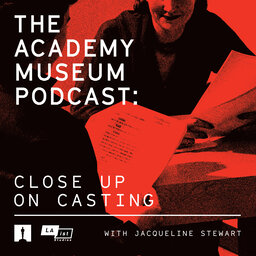1973: Marlon Brando Cannot Accept This Very Generous Award
This episode will revisit the speech actor Sacheen Littlefeather delivered on Marlon Brando's behalf to explore Native American representation in cinema and controversies about using the Oscars stage as a platform for activism.
Guests: Sacheen Littlefeather, activist/actress; Buffy Sainte-Marie, singer/songwriter
Academy Museum digital engagement platforms, including this podcast, are sponsored by Bloomberg Philanthropies.
Support for this podcast is made possible by Gordon and Dona Crawford, who believe that quality journalism makes Los Angeles a better place to live.
This program is made possible in part by the Corporation for Public Broadcasting, a private corporation funded by the American people.
The Academy Museum Podcast
Academy podcastSocial links
Follow podcast
Recent clips

Casting an Ensemble: Everyone in 'Everything Everywhere All At Once'
34:30

Casting Batman
30:27

Casting in Animation: Can't Put the Genie Back in the Bottle
36:23
 The Academy Museum Podcast
The Academy Museum Podcast
